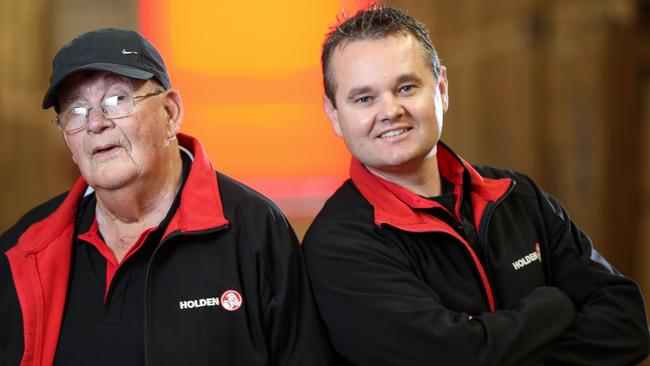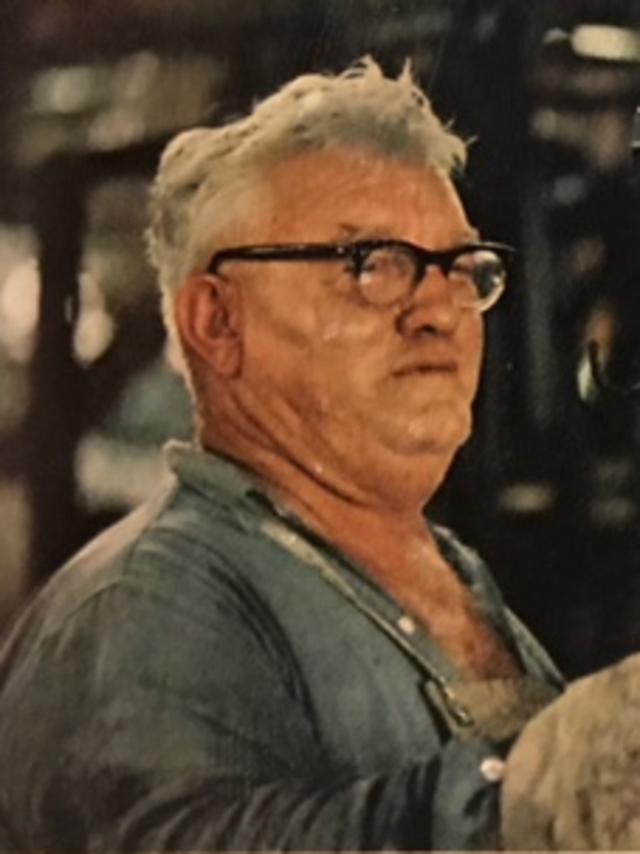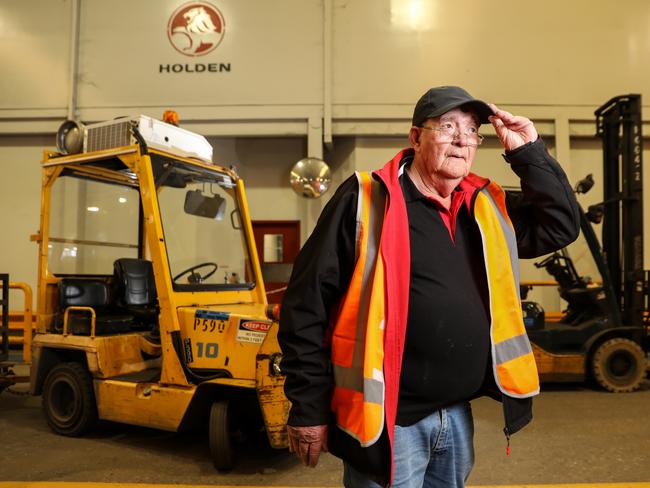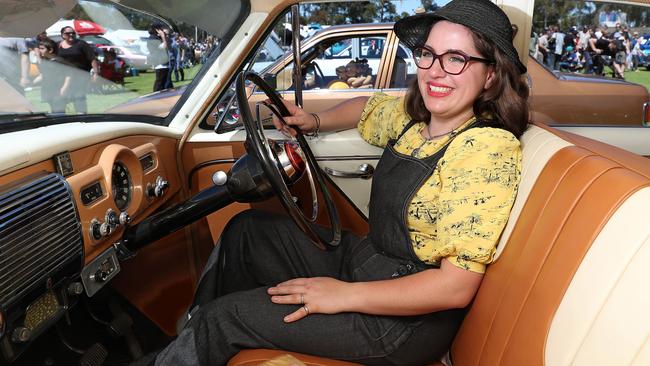Holden’s last week: Longest-serving employee Mick Randall will walk out beside mate Mick Thomson
THEY were loyal, reliable cogs in the Holden machine for decades. On Friday, the “two Micks” — one of them the longest-serving employee at Elizabeth, the other his supervisor — will walk out side-by-side.
SA News
Don't miss out on the headlines from SA News. Followed categories will be added to My News.
- Street parade for Holden’s last week in Adelaide
- How Holden’s workers are preparing for the final week
- The end of a glorious era: Holden’s last hurrah
- Podcast: Where it all went wrong for Holden
MICK Randall’s grandfather told him if he wanted a permanent job with great security, go to Holdens.
That was 53 years ago and the Ottaway resident has never heard a truer word. “Pop was right on the money.” the fork lift driver told The Advertiser.
“He said Holden was a family company and I saw that straight away. I started as a 21-year-old on January 28, 1964 and there were lots of Italians here of every generation and then the generations of Poms arrived.”
The 74-year-old father of five, a grandfather himself these days, began on the factory floor as a die setter, a skilled role needed to accurately press out body panels.
When the company outsourced that production in 2000, he moved to the warehouse at the Elizabeth South plant. He is the longest-serving member of the Elizabeth GM Holden team that will shut down on Friday.


Mr Randall will walk out the main gates side-by-side with his supervisor, Mick Thompson, 41, who across four generations, has 200 years of family service at the factory on Philip Hwy.
Mr Thompson, who began as a shop floor operator in 1994 aged 18, and has risen to a senior supervisor in the supply chain, plotted the departure of the pair nearly four years ago when the announcement of the closure occurred in December, 2013.
“I said to Mick that, if he wanted, I would help him through the next few years so we could walk together on the last day with a big smile on our faces.” — Mick Thompson
“I said to Mick that, if he wanted, I would help him through the next few years so we could walk together on the last day with a big smile on our faces,” he said.
“And that’s what will happen. We’ll walk out heads held high because there’s a lot of pride about what’s been achieved here.”
Mick 1 — don’t ever call him “Old Mick” — worked alongside Mick 2’s grandfather, Ernest and father, William, and the men’s careers have been virtual mirror images.
Both Mr Thompson’s grandparents worked for Holden for more than 30 years. His paternal grandparents met at the plant — as did his parents. Two of his siblings worked there and among the extended family, there are six uncles and two cousins who drew a GMH Australia pay cheque. “I think of what has Holden provided for my family and the answer is, everything,” the father of two said.
“I can remember being here as a kid for family days held on the grass outside the medical centre over there and I’ve done that with my wife (Katie) and the kids (girls Kayla, 11 and Emma, 7).”
ANOTHER highlight was the visit each March from the HRT Supercar team during the Clipsal 500 event, when champion drivers, including Craig Lowndes, Garth Tander and James Courtney, dropped by to sign merchandise.
Mr Randall’s fondest memory was, as leading hand, meeting legendary race car driver and Holden ambassador, Peter Brock, at the factory when the sixth millionth car rolled off the production line in June, 2001.
“Brocky knew my son Jarrod because he was crazy for Holdens and he wrote a message and signed a cap and T-shirt for him,” he said.
“Brocky was one of those who pushed for increased quality at Holden because he took his own safety seriously.”
Mr Randall, whose favourite model was the FJ, admits he’s still in shock the plant is being mothballed. He has his own reasons for what went wrong.
“I thought Holdens would keep going forever,” he said quietly. “We’re making the best quality car we’ve ever made. We lead the world in quality but it hasn’t been enough.
“Holden is an Australian institution and the government has messed up very badly. No other country in the world has gone without import tariffs. We didn’t look after our own industries.
“The people don’t want the company to go, so why is it?”
Mr Randall has always driven a Holden but other Australians, in the most competitive motor vehicle market in the world, haven’t been buying the cars in sustainable numbers for decades.
In the 1950s, the company had 40-50 per cent market share and at its peak, they were selling 100,000 Commodores — its best-ever seller — annually. Now the company only has one car, the Commodore (8th), in the Top 10 bestsellers in Australia, and the No 1 selling car, the Toyota HiLux, only sells around 20,000 units annually.
CLOSURE for Holden became an economic inevitability. The camaraderie and spirit among the staff in the most trying times has been something both men respect and will take with them.
Mick Thompson said the toughest time was the weeks following the closure announcement.
“There was a lot of negatively and finger-pointing,” he said.

“Some of that was at the employees around our pay and conditions and some parts of the overall story got lost. The blame on us (workers) was hard to cope with and was even there in your social life. You couldn’t go anywhere without something giving their opinion and you just had to cop it.
“There’s more understanding now about how big this is and the knock-on effect for individuals, families, the community, the state and even the country.”
Mr Thompson said the company and workers tried everything.
“The workforce worked one week on and one week off to try and make it viable. We all made sacrifices and we can be proud morale hasn’t been destroyed,” he added. “Our standards improved even knowing we knew we were losing our jobs. There was a determination by employee and management to make the last car the best car and that’s what we’ve done.”
Pride of place in the Holden Heritage Centre, packed with artefacts of the factory’s long history, is an old battered silver plated tea urn that did a sterling job keeping workers refreshed.
Mick 2’s father started, aged 14, the day the Plant 4 building opened in the 1960s and his first job was to push the tea-urn around the factory floor.
His son walked around Plant 4 when it shut down last week.
“It was just so sad to see all the machinery lying there silent,” he said. “I rang dad to tell him — he was there the first day, and I was there the last day.”
The days of the locally made Holden will end on Friday but the brand will still trade in Australia.
Mick Randall will finally retire, although he had a good laugh telling his career transition manager he was going to get a gun licence and become a security guard.
There are more than “a few chores” wife, Grescilda, has lined up for him at home, and he’ll have more time to cheer on his favourite footy club, Port Adelaide, but admits overall it will be “pretty hard”.
Mick Thompson is looking for new career opportunities but for now wants to be part of the skeleton staff to remain on hand to decommission the plant.
“As a supervisor I had to help my people first through transition and it was only a couple of months ago I started thinking of my own future,” he said.
“I’ve been applying for similar roles and had some encouraging feedback. When I explain that I want to be here until the last day and then to make sure we close down the operation properly — they respect that.”



